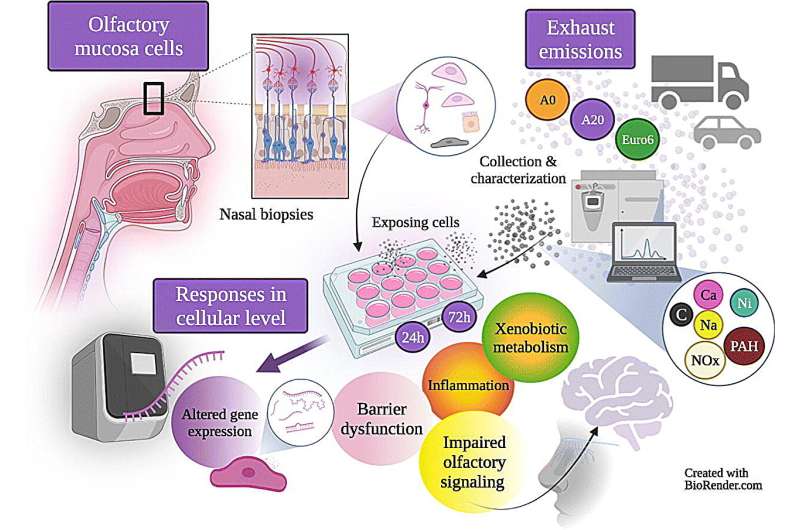This article has been reviewed according to Science X's editorial process and policies. Editors have highlighted the following attributes while ensuring the content's credibility:
fact-checked
peer-reviewed publication
trusted source
proofread
Ultrafine particles from traffic alter gene expression in human olfactory cells, study finds

Exposure to ultrafine particles from traffic alters the expression of many genes in human olfactory mucosa cells, a new study shows. The study, led by the University of Eastern Finland, is the first to combine an analysis of emissions from different diesel fuels and exhaust after-treatment systems with an examination of their effects in a human-derived cell model of the olfactory mucosa. The findings were published in Science of The Total Environment.
Particle emissions from road traffic have been regulated in the EU for decades, but emissions of ultrafine particles with a diameter less than 100 nanometers in size aren't monitored or restricted yet.
"The olfactory system has been found to mediate the effects of environmental pollutants on the brain, thus contributing to the pathogenesis of brain diseases. However, the exact signaling pathways through which the effects are mediated remain unknown," says first author, Doctoral Researcher Laura Mussalo of the Kanninen Lab at the University of Eastern Finland.
The study explored molecular-level changes occurring in human olfactory mucosa cells when exposed to different emissions derived from traffic. The researchers examined the effects of emissions on gene expression, i.e., what kind of alterations emissions cause, and what kind of mechanisms they activate. The researchers also examined whether fossil and renewable diesel fuels cause different effects, and how modern after-treatment devices, such as particulate filters, affect emissions.
The olfactory mucosa cells used in the study were obtained from voluntary donors, collected in collaboration with Kuopio University Hospital. The multidisciplinary study combined clinical medicine, gene research, molecular biology, environmental toxicology and aerosol physics.
Effects on inflammatory response and xenobiotic metabolism
The particle samples used in the exposure studies were collected by VTT Technical Research Center of Finland, and they were analyzed and characterized by VTT and Tampere University. The samples were collected from exhausts of a heavy-duty-engine vehicle run on paraffinic renewable diesel and on regular fossil diesel. The third sample was a combination of the same renewable diesel and cleaner engine technology complying with the Euro 6d-temp standard.
All emissions contained ultrafine particles. In addition, emissions from both renewable and fossil diesel contained a significant amount of polycyclic aromatic hydrocarbons (PAHs) and reactive nitrogen compounds. However, renewable diesel combined with cleaner engine technology produced very little emissions.
Exposure to ultrafine particles altered human olfactory mucosa cell function, and different fuels and engines caused different adverse effects. Furthermore, molecular-level analysis revealed disturbance in countless systems that regulate cell function. Exposure to emissions from both renewable and fossil diesel significantly altered the expression of genes associated with inflammatory response, xenobiotic metabolism, olfactory signaling and olfactory mucosa integrity.
However, renewable diesel caused less adverse effects than fossil diesel. Emissions from renewable diesel run on cleaner engine technology caused only negligible alterations in cell function, demonstrating the efficiency of engine after-treatment devices.
The findings back earlier studies suggesting that PAHs may disturb the inflammatory response and xenobiotic metabolism in human olfactory mucosa cells, and that ultrafine particles may mediate adverse effects to the brain via the olfactory pathway.
The study offers important insight into the adverse effects of ultrafine particles in a human-derived cell model of the olfactory mucosa, providing a basis for possible measures to mitigate and prevent toxicological hazards.
More information: Laura Mussalo et al, Emissions from modern engines induce distinct effects in human olfactory mucosa cells, depending on fuel and aftertreatment, Science of The Total Environment (2023). DOI: 10.1016/j.scitotenv.2023.167038


















